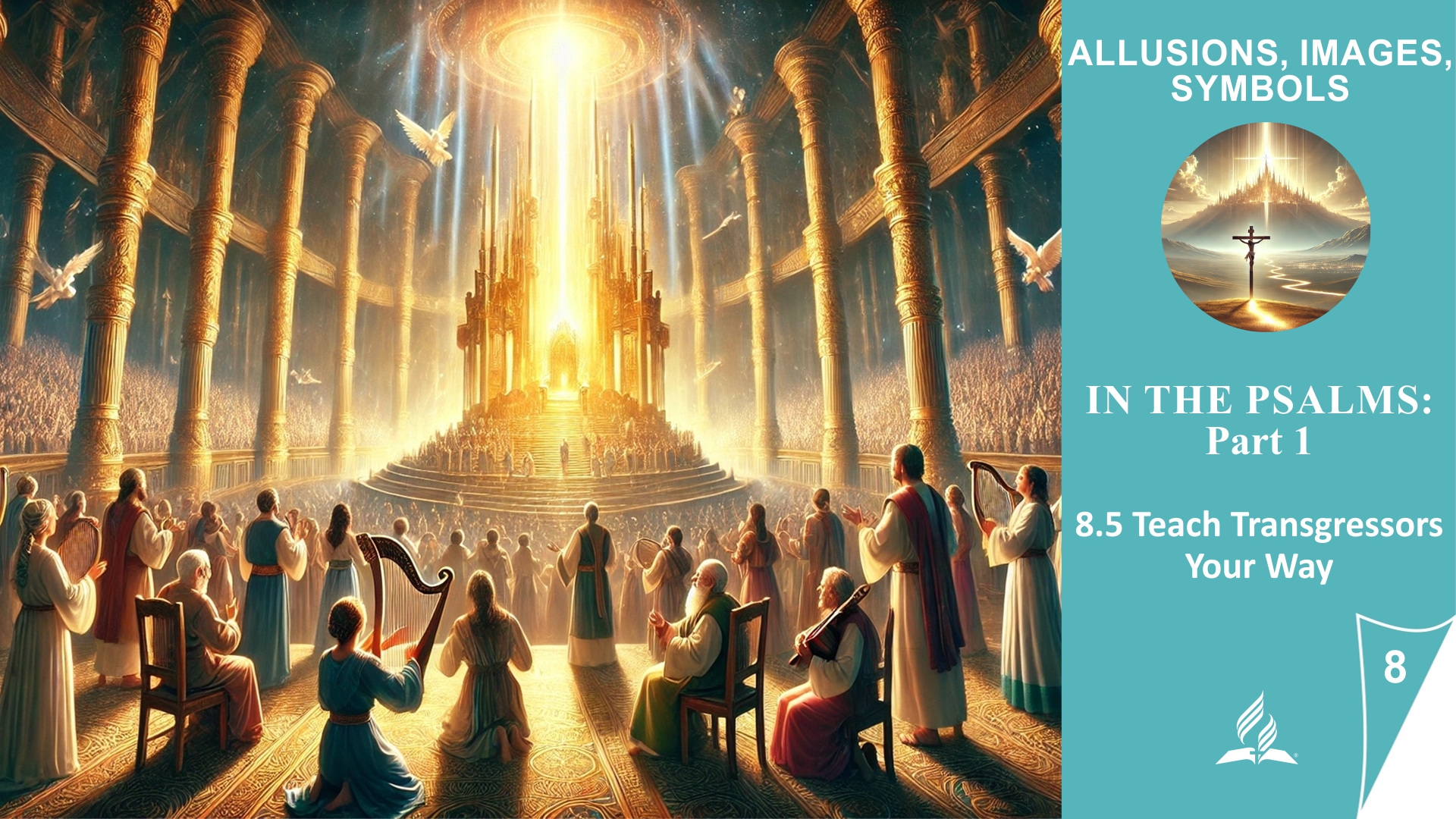Lesson 8.In the Psalms: Part 1 | 8.5 Teach Transgressors Your Way | ALLUSIONS, IMAGES, SYMBOLS | LIVING FAITH



📘 Lesson 8.In the Psalms: Part 1
8.5 Teach Transgressors Your Way
Forgiven, Cleansed—and Sent
…………………………………………………………………
🕊️📜 Introduction
God’s work with humanity doesn’t begin with a command but with grace. Isaiah wasn’t commissioned before his guilt was atoned for—but only after the glowing coal touched his lips. David didn’t promise to proclaim God’s ways before he was cleansed—but after God restored him. Even today, every call, every sending, every prophetic movement starts with one indispensable truth:
The eternal gospel—the saving, transforming grace of God in Jesus Christ.
………………………………………………………………….
📖 Bible Study
Psalm 51:9–17 – The Response to Grace
David had sinned grievously—adultery, deceit, murder. Yet instead of defending himself, he casts himself on God’s mercy:
“Create in me a clean heart, O God, and renew a right spirit within me.” (v. 12)
And then, once forgiven, he writes:
“I will teach transgressors your ways, that sinners may return to you.” (v. 15)
God’s grace doesn’t leave the fallen silent but turns them into witnesses. Those who have been forgiven are sent. Those who have experienced God’s love cannot keep it to themselves.
Revelation 14:6–7 – The Eternal Gospel First
Before the first angel calls for worship, before Babylon falls, before the beast is warned, it says:
“And I saw another angel flying in midheaven, having the eternal gospel to proclaim to those who dwell on the earth…”
The gospel comes first—not as a preface but as the foundation. Everything else—worship, warning, judgment—only carries weight when grounded in grace.
The end-time remnant are not mere critics of the world—they are witnesses of transformation. Their light does not come from self-righteousness, but from the fact that they have been redeemed—and now burn with passion for the One who set them free.
………………………………………………………………….
❓💬 Questions & Answers
🔍 Question 1: What does David promise to do after he’s been forgiven and cleansed of his sin?
He says, “I will teach transgressors your ways, that sinners may return to you” (Ps 51:15).
-
He refuses to remain silent. The forgiveness he’s received compels him to proclaim.
-
He knows that only a sinner who’s experienced grace can point another sinner to true life.
-
David becomes a teacher not by virtue of his performance, but by mercy. He has walked in God’s heart—and now wants to lead others there.
🔍 Question 2: What does placing the “eternal gospel” before the three angel messages tell us about its foundational importance?
The order is no accident. God doesn’t first call us to worship, warning, or separation from Babylon. He calls us to repentance—through the good news that forgiveness is available.
-
The gospel makes worship possible—only in truth and gratitude can we genuinely honor God.
-
The gospel gives meaning to warning—we know we’re inviting people into freedom, not fear.
-
The gospel makes the end-time message credible—because we ourselves have been redeemed and changed.
Without the gospel, the three angels have nothing to say. With it, they bear the light of hope into a dark world.
………………………………………………………………….
✨ Spiritual Principles
-
God never calls without first extending grace. Calling always follows forgiveness.
-
Those who have been forgiven become messengers. Grace longs to be shared.
-
The gospel is the foundation of all prophetic truth. Without it, there is no authentic message.
-
Evangelism is not a duty but the natural fruit of a transformed heart.
………………………………………………………………….
🧩 Daily Application
-
Reflect on your own story. Where has God touched, healed, and called you? Share it!
-
Start with grace. If you want to draw people to God’s truth, begin with His love.
-
Be honest about your past. Your weaknesses often unlock another’s heart.
-
Live sent. See every day as a chance—through words or deeds—to bear the gospel forward.
………………………………………………………………….
✅ Conclusion
Isaiah said, “Here am I; send me!”—only after he was cleansed.
David said, “I will turn sinners back to you”—after he received grace.
The angels proclaim judgment, Babylon’s fall, the beast’s doom—but first, they declare the eternal gospel.
The redeemed are sent. The forgiven become vessels of mercy. And those who grasp the gospel cannot remain silent.
………………………………………………………………….
💭 Thought of the Day
Evangelism begins not with a commission—but with an encounter with grace.
………………………………………………………………….
🕯️📘 Illustration – “I Will Sing”
Leon, 41, was a street musician in Cologne. He was known not just for his music but for his past—addiction, theft, prison. His songs sounded raw, honest, broken—like his soul.
One day he sat under a bridge, guitar silent, staring into nothing. A young man sat beside him—not to give money, but to listen.
“I know your story,” said the young man. “But I have another one for you. Want to hear it?”
Leon shrugged. The young man spoke of the Lamb of God who bears sin, of a judgment that frees rather than condemns, of a future where even someone like Leon is not forgotten.
Leon laughed. “Sounds nice. But not for me.”
The young man replied, “Especially for you. Because God doesn’t call the righteous; He calls sinners.”
In the days that followed, Leon read Psalm 51 over and over—until he wept.
“Wash me, and I shall be whiter than snow. Create in me a clean heart.”
And then: “I will teach transgressors your ways.”
That became his verse. His calling.
He wrote a new song—not about pain, but about hope. Not about guilt, but about grace.
He performed it in the pedestrian zone. People stopped. One wept. A woman sat beside him. And Leon said, “I know your darkness. But I also know the light. Want to hear it?”
He became a singer of the gospel—not perfect, not polished, but redeemed.
One day, singing for youth in a center, he shouted, “Believe me—I’ve failed. But I found someone who never turned me away. And so today I can say: I am free. And I will sing.”




















